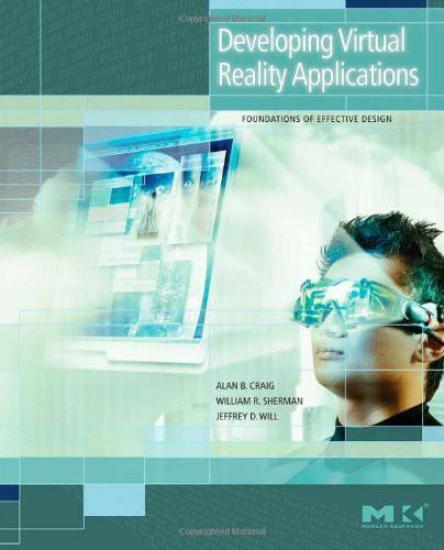
Summary:
Virtual Reality systems enable organizations to cut costs
and time, maintain financial and organizational control over
the development process, digitally evaluate products before
having them created, and allow for greater creative
exploration. In this book, VR developers Alan Craig, William
Sherman, and Jeffrey Will examine a comprehensive collection
of current,unique, and foundational VR applications in a
multitude of fields, such as business, science, medicine,
art, entertainment, and public safety among others. An insider's view of what works, what doesn't work, and
why, Developing Virtual Reality Applications explores core
technical information and background theory as well as the
evolution of key applications from their genesis to their
most current form. Developmental techniques are
cross-referenced between different applications linking
information to describe overall VR trends and fundamental
best practices. This synergy, coupled with the most up to
date research being conducted, provides a hands-on guide for
building applications, and an enhanced, panoramic view of VR
development. Developing Virtual Reality Applications is an
indispensable one-stop reference for anyone working in this
burgeoning field. Dozens of detailed application descriptions provide
practical ideas for VR development in ALL areas of
interest! Development techniques are cross referenced between
different application areas, providing fundamental best
practices! Includes a media-rich companion website with hours of
footage from application demonstrations Developing Virtual Reality Applications Foundations of Effective Design Alan B. Craig, William R. Sherman, Jeffrey D. Will Virtual Reality systems enable organizations to cut costs
and time, maintain financial and organizational control over
the development process, digitally evaluate products before
having them created, and allow for greater creative
exploration. In this book, VR developers Alan Craig, William
Sherman, and Jeffrey Will examine a comprehensive collection
of current,unique, and foundational VR applications in a
multitude of fields, such as business, science, medicine,
art, entertainment, and public safety among others. An insider's view of what works, what doesn't work, and
why, Developing Virtual Reality Applications explores core
technical information and background theory as well as the
evolution of key applications from their genesis to their
most current form. Developmental techniques are
cross-referenced between different applications linking
information to describe overall VR trends and fundamental
best practices. This synergy, coupled with the most up to
date research being conducted, provides a hands-on guide for
building applications, and an enhanced, panoramic view of VR
development. Developing Virtual Reality Applications is an
indispensable one-stop reference for anyone working in this
burgeoning field. Dozens of detailed application descriptions provide
practical ideas for VR development in ALL areas of
interest! Development techniques are cross referenced between
different application areas, providing fundamental best
practices! Includes a media-rich companion website with hours of
footage from application demonstrations! William R. Sherman is the Technical Director of the Center
for Advanced Visualization, Computation and Modeling (CAVCaM)
at the Desert Research Institute (DRI) in Reno, NV. He is
responsible for both the hardware and software
implementations that provide the infrastructure for immersive
and other visualization technologies at DRI. In addition to
his DRI responsibilities, Bill teaches a course on virtual
reality for the Computer Science and Engineering department
at the University of Nevada, Reno. Dr. Jeff Will is an Associate Professor at Valparaiso
University. He received his Ph.D. in electrical
engineering at the University of Illinois at
Urbana-Champaign. In 2002, he was named the Fredrick F.
Jenny Professor of Emerging Technology in Engineering. He
established the college's Scientific Visualization
Laboratory, where he has directed students in major research
projects and taught VR technology and programming courses to
undergraduates as well as aided faculty from other
disciplines to integrate VR into their curricula. Dr. Alan B. Craig is the Associate Director for
Human-Computer Interaction at the Institute for Computing in
Humanities, Arts, and Social Science (I-CHASS) at the
National Center for Supercomputing Applications (NCSA) at the
University of Illinois at Urbana-Champaign. Alan has been
with NCSA since 1987. Alan holds a B.S. in Chemistry /
Secondary Ed., an M.S. in Computer Science, and a Ph.D. in
Information Science, all from the University of Illinois at
Urbana-Champaign. Dr. Jeff Will is an Associate Professor at Valparaiso
University. He received his Ph.D. in electrical engineering
at the University of Illinois at Urbana-Champaign. In 2002,
he was named the Fredrick F. Jenny Professor of Emerging
Technology in Engineering. He established the college's
Scientific Visualization Laboratory, where he has directed
students in major research projects and taught VR technology
and programming courses to undergraduates as well as aided
faculty from other disciplines to integrate VR into their
curricula.
From the Back Cover
About the Author